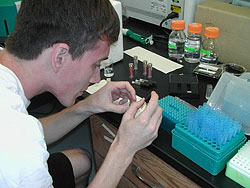Colin Boettcher
Spectroscopic Characterization of the Active Site of γ-Glutamylcysteine Synthetase
Biochem/MBC, Dr. Kelly

About My Research:
Glutathione is a molecule that is important due to its protective, antioxidant activity within human cells. However, it has also been linked to resistance to chemotherapy. Under the direction of Dr. Brenda Kelly, I have been investigating one enzyme that is in part responsible for making glutathione, γ-glutamylcysteine (γ-GCS). If we can inhibit the γ-GCS enzyme in select cells, then chemotherapeutic drug resistance may be reduced. Our project examines the effects of substrate analogs (molecules that could mimic the natural substrate for the enzyme) on γ-GCS purified from the bacterium E. coli. We indirectly monitor γ-GCS activity by using measuring the light absorbed during chemical reactions. Comparing these data help us determine the role of substrate analogs in activation and inhibition of the enzyme γ-GCS. Further projects include measuring the vibrations of the chemical bonds themselves as they form or break. This technique (called Resonance Raman spectroscopy) will allow us to probe structural changes in the enzyme upon binding of substrate analogs and help us understand how a chemotherapy-resistance enzyme can be “fooled” for better treatment.
This research was supported by the 2007 Greater Gustavus Summer Research Fund.
In the student's own words :
"I believe that the best aspect of research at Gustavus is the close contact between the profesors and the students. This initiates an environment welcome to questions and furthering development of ideas first learned in the classroom."
Professional Abstract:
Glutathione plays an important biological role in detoxication in nearly all eukaryotes. Recently, it has been implicated in chemotherapeutic resistance due to its high abundance in many cancer cells and its ability to slow or block chemotherapeutic effects. By inhibiting glutathione synthesis, cancer cells may become more susceptible to some therapeutic techniques. The enzyme, γ-glutamylcysteine synthetase (γ-GCS) catalyzes the first step in the synthesis of glutathione. In the present study, UV/Vis spectroscopy was used to identify substrate analogs that alter the activity of γ-GCS, while fluorescence spectroscopy was used to probe the effect of these analogs on the binding of natural substrates. These studies suggest that the enzyme active site contains two distinct binding sites that may be filled with a cysteine-like molecule. To further investigate the metal-binding sites of γ-GCS, preliminary titration studies with cobalt were performed for future study of the enzyme using NMR.
More student thoughts:
"Research at Gustavus has created stronger relationships between both fellow students and the professors who advise our work. This is important [because] these are the students and professors who are in the classroom and labs working alongside us all school year."
Links:
- Learn more about the Department of Chemistry
- Go to the student's Faculty Research Advisor
- The Gustavus chapter of Sigma Xi
Update:
Colin and Kelly Rozenboom were awarded a Sigma Xi Grant-in-Aid of Research and co-presented their research at the 2008 Sigma Xi symposium and also at the 2008 Celebration of Creative Inquiry